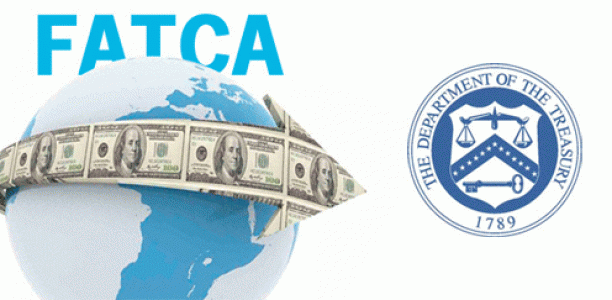
Heard of FATCA? In this article I will try and simplify this rather complicated subject to make it easier to understand. FATCA—the Foreign Account Tax Compliance Act—is America’s global tax law. It was quietly enacted in 2010, and after a four-year ramp up, it’s finally in effect. FATCA requires foreign banks to reveal Americans with accounts over $50,000 and non-compliant institutions could be frozen out of U.S. markets, so everyone seems to be complying.
According to U.S. law, all U.S. citizens regardless where they live have an obligation to pay taxes on their worldwide income. In addition, in cases where the aggregate value of all foreign accounts exceeds $10,000 at any time during the calendar year they also have to report this information on a special form commonly known as the FBAR. Since July 1, 2013, the FBAR needs to be e-filed before June 30 of the following tax year.
In addition, a new from was created under FATCA legislation, Form 8938, which needs to be filled out and attached to the annual income tax return. This form needs to be filed by U.S. taxpayers who have an interest in foreign financial assets including financial accounts, certain foreign securities, and interests in foreign entities with an aggregate value exceeding $50,000.
Under FATCA, foreign financial institutions (banks, hedge funds, pension funds, insurance companies etc.) are required to report to the U.S. tax Authorities (the IRS) certain information about foreign accounts held by U.S. taxpayers, or by foreign entities in which U.S. taxpayers hold a substantial ownership interest.
So in the event that up until now you have not paid income tax and/or reported your foreign accounts to the IRS, this information will become known to the IRS through the banks.
The banks are requesting from all their U.S clients to sign Form W-9. This is a form that requests US citizens to provide their identification number and other personal information for U.S. tax purposes. This information is then provided to the IRS. Once the IRS has the information provided they can check and see if you have complied with your tax duties according to their files. Refusing to sign such a form can result in the bank freezing your account.
If a US account holder refuses consent for a bank to pass its information to the IRS, it will be a “recalcitrant account holder” and payments made by it, and accounts held by it, will be subject to a 30% withholding tax. Nevertheless, the IRS may also request from the tax authority of the foreign country information regarding Non- Consenting U.S. Accounts (as per Article 3 and Article 5 of the Agreement between Switzerland and the U.S.A. for Cooperation to Facilitate the Implementation of FATCA).
Not complying with your U.S. tax or FBAR reporting duties could be considered a criminal offense in addition to a civil one.
The civil penalties can be very high. For instance, the civil penalty for willfully failing to file an FBAR can be as high as the greater of $100,000 or 50% of the total balance of the foreign account per violation. The criminal penalties can be harsh, for instance a person who fails to file a tax return is subject to a prison term of up to one year and a fine of up to $100,000. Failing to file an FBAR subjects a person to a prison term of up to 10 years and criminal penalties of up to $500,000.
You should talk to your CPA, but the two main options are either participating in the Offshore Voluntary Disclosure Program (OVDP) or participating in the Streamlined Filing Compliance Procedure.
- Offshore Voluntary Disclosure Program – This program provides a uniformed penalty structure for U.S. citizens who come forward voluntarily and report all their previously undisclosed foreign accounts and assets. The voluntary disclosure period is the most recent eight tax years for which the due date has already passed. At the moment the program includes years 2005 through 2012 and there is no set deadline to apply. This procedure has a few stages, and can take a year or two until you reach a final agreement with the IRS after which it closes your file. If you are accepted into the program, you will be cleared from any criminal prosecution. Once that occurs, you will need to prepare and submit income tax returns and FBAR forms for the last 8 non compliant years (currently 2005 through 2012), together with some other documents that need to be submitted as well. Through this program, you have to pay all income tax due including any interest and accuracy penalty involved, and an FBAR penalty, of either 5%, 12.5%, or 27.5%, (depending on the case), of the highest aggregate balance during the period covered by the voluntary disclosure. In addition, there may be a requirement to amend state tax returns and report the undisclosed foreign income. Each state has its own rules regarding the procedure that needs to be followed in order to be compliant.
- Streamlined Filing Compliance Procedures for non-resident U.S. taxpayers. This procedure is ONLY available for non-resident U.S. taxpayers who have resided outside of the U.S. since January 1, 2009 and who have not filed a U.S. tax return during the same period. Through this program you will need to file delinquent tax returns, only for the past three years and to file delinquent FBARs for the past six years. If the IRS agent accepts the case brought before him as appropriate for the Streamlined Procedure, the review of the case will be expedited and the IRS will not assert penalties or pursue follow-up actions. This means that there is a chance the FBAR penalty will be waived. This procedure is much shorter and less “painful” to your wallet but take note that the IRS has full discrepancy to decide to accept the case into this streamline procedure or not.

Recent Comments